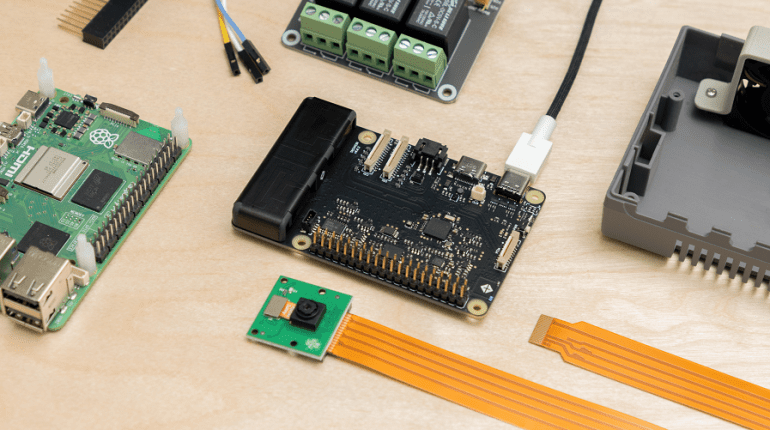- Particle Industries Inc. has introduced Tachyon, a new single-board computer.
- Tachyon is positioned as a competitor to the Raspberry Pi, with over 60 million units sold since 2012.
- The company is funded by over $80 million from investors, including Qualcomm Inc.
- Particle’s cloud platform supports remote device management and connectivity solutions.
- Tachyon features an eight-core CPU with speeds up to 2.7 GHz, 4 GB of RAM, and a 64 GB UFS SSD.
- It supports edge AI applications with a neural processing unit capable of 12 trillion calculations per second.
- The device includes an Adreno 643 GPU for multimedia processing and supports USB-C for data output and charging.
- Tachyon can be equipped with an internal battery for portable use and has built-in antennas for Wi-Fi and 5G connectivity.
Main AI News:
Particle Industries Inc., a burgeoning startup from San Francisco, has launched Tachyon, a cutting-edge single-board computer aimed at advancing connected device technologies. This new offering is set to compete directly with the well-established Raspberry Pi series, which has seen substantial adoption, with over 60 million units sold since its debut in 2012. Raspberry Pi boards have been integral in powering a wide array of applications, from agricultural automation to industrial robotics and satellite systems.
Backed by over $80 million in investments from Qualcomm Inc. and other prominent backers, Particle Industries leverages a cloud platform designed for managing and optimizing fleets of connected devices. This platform provides developers with tools to remotely configure devices, deploy updates, and troubleshoot issues. Complementing its software capabilities, Particle offers hardware solutions that enable seamless internet connectivity through 5G and Wi-Fi.
The Tachyon, measuring approximately the size of a credit card, represents a significant expansion in Particle’s hardware lineup. It features an eight-core CPU from Qualcomm, with core speeds ranging from 1.9 GHz to 2.7 GHz. The computer is equipped with 4 GB of RAM and a 64 GB UFS SSD, with the option for additional external storage via an NVMe-compatible USB-C port.
Designed with edge AI applications in mind, Tachyon integrates a neural processing unit capable of executing up to 12 trillion calculations per second, making it ideal for tasks such as real-time production line monitoring using computer vision. Additionally, it includes an Adreno 643 GPU to enhance multimedia processing and support for external displays via USB-C, which also doubles as a charging port. For added flexibility, Tachyon can be ordered with an internal battery, allowing operation in environments without direct access to power.
Particle’s innovation with Tachyon extends to its built-in wireless capabilities, featuring integrated antennas for Wi-Fi and 5G connectivity. This design choice simplifies the development of connected systems by eliminating the need for external antennas, streamlining the creation of sophisticated, networked solutions.
Conclusion:
The introduction of Tachyon by Particle Industries represents a significant advancement in the single-board computer market. By offering a robust alternative to the Raspberry Pi, Tachyon is poised to attract both industrial and consumer applications. Its advanced features, such as high-speed processing, edge AI capabilities, and integrated connectivity, cater to emerging needs in connected device management and real-time data processing. Particle’s entry into this competitive space with substantial backing and innovative technology could drive increased adoption of single-board computers in various sectors, potentially reshaping market dynamics and elevating standards for performance and connectivity.

